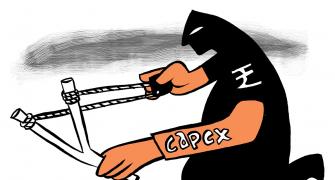Brokerage stocks have been on a bit of tear, they have been re-rated in the last couple of months and we have seen a lot of interest from the global players.
Etrade, BNP Paribas, Bank of Muscat are all picking up stakes in many of the Indian brokerage firms. So what is attractive in them and how is this space shaping up and what is the potential?
N Jayakumar, CEO of Prime Securities examines the brokerage space. According to him, there is a huge gap between the secondary market valuations and valuations by international investors
Excerpts of CNBC-TV18's exclusive interview with N Jayakumar:
How do you read this space and do you see more of these deals happening where global guys try and get foothold into some of those Indian brokerage firms?
It is active time in our space. I think it is fair to say that what you have seen is only the tip of the iceberg. In a sense, the tip is really small in this particular case because if we see more movement and more activity, this space is dominated by franchises that are driven by individuals and people.
So in a people driven business, the best way to set up shop in India for many overseas investment bankers or asset managers or whether it is the debt restructuring people is clearly to get footholds into established players in the Indian market.
It is true that while the bulge bracket is taken up by people who want to come in either direct or through alliances that have already happened and fructified, it is in the smaller space that we see big activities happening where niches like the madcap space or niches like a very strong debt market presence will actually bring in a number of dedicated focus players into this market.
It is true that what you see in terms of general activity is masking the actual interest. It is specifically where somebody wants to come and take a play in either a retail distribution space or in a debt restructuring space or in the entire space, which involves raising capital for small and midcap companies.
In each of this spaces now, there are well-entrenched players and thankfully for some of us, it is not just the bulge-bracket players.
For pure brokerage firms, is there a gap between how the market is valuing today in the secondary space and how some of the larger investment banks or financial entities could look at valuing these entities when they are trying to get in?
I think there is a huge gap. The hiatus is essentially a combination of the ignorance, which means that there is very little knowledge of what each of these players are doing. I think deals like that of Geojit Financial indicate that attention is being given on specific individual players.
I think the brokerage space is interesting. It is also in some sense, regional. While people want to come in and take a national presence here, I think the national players are well known.
So when you say brokerage, it could be the pure individual retail brokerage or a combination of margin financing cum retail brokerage or purely HNI kind of business or it could be pure institutional business, which means broking houses, servicing and catering to the needs of a clutch of hedge funds. So even brokerage today is being delineated in a much sharper and a much better and well-defined way.
Is it fair then to compare them with international brokerages from here on?
When you say brokerages, I am not being immodest when I say that Prime Securities is a key player in certain niches that we talked about. We are seeing significantly under brokered areas in the market where we are able to play a significant role in terms of what international investors are looking for.
Even when it comes to international participatory note writers, a number of brokerages are already - even our firm have established loose tie-ups, in terms of execution today. The execution then follows up with idea based or getting investors that they have to a participate in the Indian market.
So clearly there are multiple gaps, which big bulge bracket brokering houses are not able to fulfill and which brokerages like us are able to fulfill. It is these needs, which today are being expressed specifically by international investors to the international counter party brokers overseas and which results in people like us getting business specifically in the midcap, either thematic or stock specific enquiries.
What does it mean for a minority shareholder because sometimes when global hands enter some of these brokerages, they tend to get more mind space than maybe a domestic standalone entity?
I want to distinguish between two things - one is an ongoing business relationship. It is possible that in the evolution of this market, and more people believe now, that we are into a much longer structural bull story, where many of these brokerages
They actually want an equity stake to be able to fashion the broking house they are dealing with. So it is possible with many broking houses and I don't want to fan speculation by saying that we are talking to.
Like so many other broking houses, we are constantly being sort of enquired of in terms of our financials, our orientation, etc.
Therefore, it is true to say that like us, many of the broking houses too are getting enquiries in terms of long term association, which could or will definitely take on equity ownership patterns.
What it means to minority or any other shareholder is a decided re-rating on the stock. It is already beginning to happen, the industry leaders whether it is the bulge bracket broking houses or DSP Merrill Lynch, JM Morgan Stanley or some of the smaller ones are clearly seeing re-rating, whether on the NSE screen or on their business planner.
So from that point of view, it would not surprise me that a clutch of other deals are slated to happen. Again as I said, I don't want to fan speculation by saying this in any manner implies that 'Prime' is in play.
I don't mean to say that but clearly if the question is that will shareholders benefit if such a move were to happen, I would like to believe they would as long as it is clear that this is not something that we are feeding off for fad of the season, which is to say get equity ownership from a foreign broking house or a foreign set of investors.
I think if there is a structural fit, which means that in their markets, they are catering to companies of this kind or have got investors who ought look into companies of the kind that we are catering to or businesses that we are doing, then clearly we are talking about some kind of a fit coming through.
Wealth management, I believe, where some of these broking houses could get NRI clients, could get overseas high net worth individuals coming into investing in the Indian market. I think wealth management will be a very big boost and recently, we have launched wealth management services in Prime as well.
What shape do you see this taking? Do you see any buyouts with open offer from some of the global players or essentially this being a minority stake play and both trying to exploit each other synergies? Secondly, how are some of these global guys valuing the brokerage businesses that they are entering? Is it on franchise or on earnings - how are they looking at doing it?
To answer your second question first, they are looking at stickiness of the franchise which means is this franchise something that has come about as a result of a bull market or is this something that has been growing.
So effectively, what they are doing is some kind of a trend analysis to see how over the last 12 quarters, businesses has been moving up or over the last 16-18 quarters, business has been moving up and use that to indicate for themselves whether some of these franchise will stay.
Also it is important how companies have fashioned themselves in the growth phase - whether they have, for instance, been opportunistically driven or are actually constantly focused on sector that is growing.
I believe valuations today are attractive enough for foreign brokerages and foreign investment banks to pay in some cases even hefty premium and yet be below their threshold rates of return or their benchmark IRRs on business here.
Payback periods in this business can be fast because a lot of brokerages today have decidedly large percentage of market cap in cash and cash equivalent. So really, what you are paying for is a small fraction in terms of the franchise value.
To answer your first question, will this be a sell out, will this be a part ownership - if they could do this all themselves, most of these international arms would want to come and do this by setting up a 100% sub with a capital requirement that RBI specifies.
But if they want to be in a partnership mode, they need to establish clearly for themselves that they are doing this because the franchise and the people on the ground are more valuable than anything else.
Therefore, they will respect that and structure everything else including whether compensation or takeouts or bonuses commensurate with what they believe the local players are getting, which means that I believe in most cases it will be taking the local managements along with them. None of them will happen in a hostile way.
This will be clearly synergistic based on what the local players are able to get to the table, which means clients, businesses, stickiness of the franchise and ongoing annuity, which they are feeding into by paying a small premium.
For more on markets & business, log on to www.moneycontrol.com.







